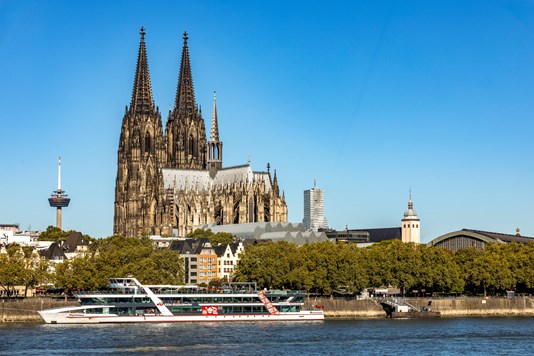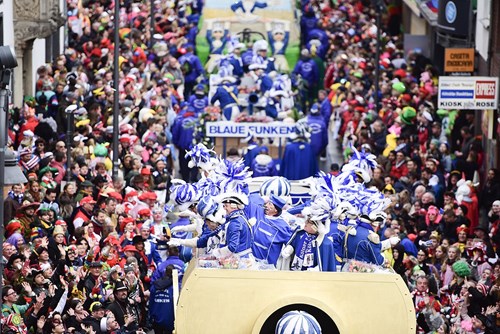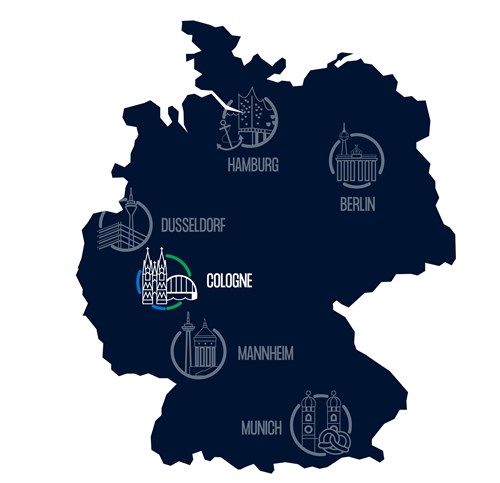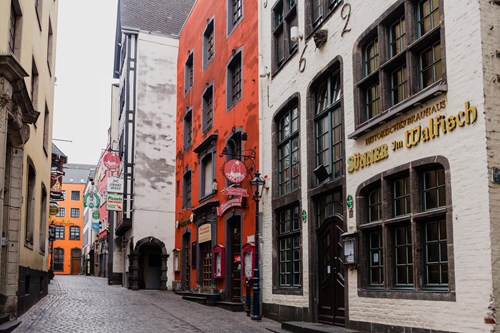
Cologne
COLOGNE 
MAIN ROUND/FINAL WEEKEND
The tournament is not only a great chance to cheer for their favourite team in main round group I and the final weekend, but also to enjoy the Cologne way of living, some special museums and the one and only Kölsch beer, combined with traditional home-made brewery food. The best way of experiencing this Cologne spirit is doing a brewery tour in the old town.
FANZONE in Cologne
If you want to soak up German sports history and then watch top handball matches live on large screens, the German Sport & Olympic Museum on the banks of the River Rhine is the right place for you. Located in close proximity to the old town and with a straight train connection to the LANXESS arena, the Cologne fan zone is open from 18 to 28 January (except 25 and 27 January), from 14:30 to 22:30 CET. The extensive program also includes numerous food trucks in front of the museum.
Address: Im Zollhafen 1, 50678 Cologne
How do I get to the arena in Cologne?
BY CAR: No matter where you are traveling from: thanks to its central location in the Deutz district on the right bank of the Rhine, the LANXESS arena is easy to reach. Follow the signs “LANXESS arena” and “Koelnmesse”. You will find the arena located in the immediate vicinity of the Deutz train station. Sufficient parking options are signposted directly at the arena.
You can use the following address for route planners:
Willy-Brandt-Platz 3, 50679 Cologne
BY PUBLIC TRANSPORT: The trains RB 24, 26, 27 and 38, the RE 1, 9, 12 and 22 as well as various ICEs stop at the Köln-Messe/Deutz train station. Also the S 6, 11, 12, 13 and 19. The subway and tram lines 1, 3, 4 and 9 stop at the stops Bf. Deutz/Messe, Deutz/LANXESS arena train station and Deutz, Technical University. The bus lines 150,153, 179, 196, 250 and 260 also serve the stop.
The busstops
-
Deutz / Messe train station
-
Deutz train station / LANXESS arena
-
Deutz Technical University
are served by tram lines 1, 3, 4 and 9 and bus lines 150, 153, 156, 250 and 260 and are located directly at the LANXESS arena.
Are there any bag restrictions in the arena?
The ban affects bags and backpacks as well as gym/fabric bags from a size of DIN A4 (21 cm x 29.7 cm).
Deviating from this, stricter regulations of the respective organizer may apply. Before your visit, please check the event details page for the most current information about the respective event.
When do the doors to the arena open?
Usually, doors open two hours before the match starts, however there may be deviations for certain events. Please check your ticket or arena's website.
You can find more detailed information on the arena's website: https://www.lanxess-arena.de/besucherinfos/barrierefreiheit
What to do in Cologne?
With around 1.1 million inhabitants, Cologne is the largest city in North Rhine-Westphalia and the fourth largest in Germany. The city on the Rhine is the centre of the Rhineland metropolitan region with around nine million inhabitants.
The Cologne Cathedral is the most visited sight all over Germany, and the LANXESS Arena is nicknamed the ‘Cathedral of Handball’ after hosting events such as the EHF FINAL4, the 2007 and 2019 World Championships, and, since 2023, the final tournament of the German cup.

With around 1.1 million inhabitants, Cologne is the fourth largest city in Germany. The city is one of the most important travel destinations in Europe, mainly because of its more than 2,000 years of history, important events and its cultural and culinary heritage. Cologne was founded by the Romans and received city rights as early as 50 AD.
Since centuries and still today, Cologne is famous for its carnival, which takes place in February. The city will be gearing up for the festival already in January, so handball fans can get a taste of the atmosphere. If you decide to stay on for Carnival itself, make sure you wear a costume or mask, and learn the salute “Kölle, alaaf!” (essentially, “Cologne above all!”)


In the old town (Alter Markt), but also across the whole city fans will find hundreds of pubs, where Kölsch beer is served immediately. Even if the glass is not empty, you will get a new one until you put the beer mat on top of your glass – this means “enough!” And don’t be surprised, if the waiter (or ‘Köbes’) enjoys a beer with you on your bill.
Though there is no handball club in Cologne, the city is famous for its sports teams such as football club 1. FC Köln and ice hockey side Kölner Haie. Cologne also hosts the official German Olympic and Sports Museum, on the banks of the river Rhine, with plenty of German sports memorabilia, including handball.

If you visit the museum, make sure you also check out a completely different museum next door: the chocolate museum, founded by the Stollwerck family, one of Germany’s best-known chocolate producers. The highlight of this museum is the famous chocolate fountain. As of course ‘Eau de Cologne’ was invented in Cologne, you can smell the development of this perfume in the Farina museum, the home of the original Eau de Cologne.
Come enjoy the main and final round in Cologne: Get your tickets here




